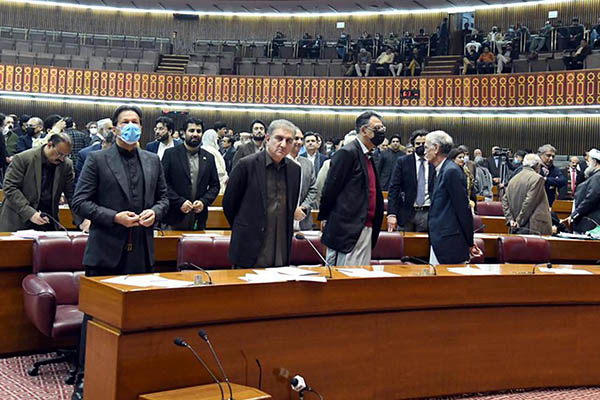
Photo courtesy PID
PTI-led government also passes 14 additional pieces of legislation in hours-long session of Parliament
The Pakistan Tehreek-e-Insaf (PTI)-led government on Thursday “bulldozed” 16 new legislations through the National Assembly, including the controversial “mini-budget” and a bill seeking greater autonomy for the central bank, as opposition parties protested against the “anti-people” measures.
The hours-long parliamentary session—concluding around midnight—was attended by all senior party leaders, including Leader of the Opposition Shahbaz Sharif, Pakistan Peoples Party Chairman Bilawal Bhutto-Zardari, and Prime Minister Imran Khan. Despite massive uproar throughout, the government managed to get both the Finance (Supplementary) Bill, 2021 and the State Bank of Pakistan (Amendment) Bill, 2021 passed—mandatory “prior actions” needed for the International Monetary Fund (IMF) to revive a stalled $6 billion loan facility.
Both IMF-required bills drew loud protests and condemnations from the opposition, who pointed out that recommendations provided by the Senate had not been considered and urged the government to debate them prior to voting them into law. Describing the SBP bill as a an “attack” on the country’s financial sovereignty, opposition leaders accused the government of trying to place the central bank under the control of the IMF through its passage.
Mini-budget
The amended supplementary finance bill passed by the National Assembly withdrew certain additional sales taxes on items that had drawn the public’s ire, including infant formula milk, bread, small cars, laptops and personal computers. Contrary to the bill presented by Finance Minister Shaukat Tarin last month, the legislation passed does not impose any GST on 200-gram carton of milk; imposes 17% GST on infant formula worth Rs. 500; increases tax on imported vehicles from 5% to 12.5%; retains existing federal excise duty on all imported vehicles; reduces duty on locally manufactured 1,300cc vehicles from 5% to 2.5%; reduces duty on locally manufactured 1,300-2,000cc cars from 10% to 5%; imposes 10% duty on locally manufactured cars greater than 2,100cc; and removes taxes on iodized salt and red chilies.
Several amendments proposed by the opposition were rejected outright by the government members during the session.
Addressing Parliament ahead of the vote, the finance minister reiterated that the withdrawal of Rs. 112 billion tax exemptions on machinery, and Rs. 160 billion on pharmaceuticals, were adjustable and refundable. He said these taxes, which experts say will directly or indirectly impact consumers, would raise around Rs. 71 billion in revenue for the government. He said the entire point of the mini-budget was to increase documentation of the economy, and accused the opposition of wanting to secure exemptions for “luxury” items for the country’s elite.
Under the new finance bill, GST has been raised on 42 items—including cars, electric vehicles, import of scrap, branded dairy items, branded cereals, silver and gold bars and jewelry, machinery—from 1-10% to 17%, with an aim to raise an additional Rs. 30 billion in revenue. Similarly, 17% GST has been imposed on several food items, including bread, vermicelli, naan, chapatti, sheermal, bun and rusk sold in Tier-1 bakeries, restaurants, food chains and sweet shops. These products will remain exempt from sales tax at shops that don’t fall into this category. The government maintains that it will further facilitate the average consumer by providing targeted subsidies for the impoverished.
The bill also withdraws exemptions on 11 local products, including bakery items and sweetmeats, food served in restaurants, sausages and branded poultry and meat products, rapeseed, mustard seed, sprinklers, drip and spray pumps.
Under the mini-budget, exemptions have been withdrawn on 59 imported items, with an aim at generating Rs. 206 billion in revenue. These include live animals, birds and eggs, meat from cows, buffaloes, sheep, goats, poultry and fish, vegetables, cereals, fish feed and animal feed, journals and periodicals as well as pharmaceutical raw materials. The government has also withdrawn exemptions on the import of 19 capital goods, such as power generation, power transmission, renewable energies like solar, wind, nuclear, mining and extraction of minerals.
Bills passed
In addition to the SBP bill and the mini-budget, the PTI-led government laid down a new ordinance and also passed the following bills:
- Public Procurement Regulatory Authority (Amendment) Bill, 2021
- Islamabad Healthcare Facilities Management Authority Bill, 2021
- Allied Health Professionals Council Bill, 2021
- Pakistan Nursing Council (Amendment) Bill, 2021
- Oil and Gas Regulatory Authority (Amendment) Bill, 2021
- University of Engineering and Emerging Technology Bill, 2021
- Securities and Exchange Commission of Pakistan (Amendment) Bill, 2021
- National Information Technology Board Bill, 2019
- Protection against Harassment of Women at the Workplace (Amendment) Bill, 2022
- Government Savings Bank (Amendment) Bill, 2021
- Post Office National Savings Certificates (Amendment) Bill, 2021
- Protection of Parents Bill, 2021
- National Metrology Institute of Pakistan Bill, 2021.
